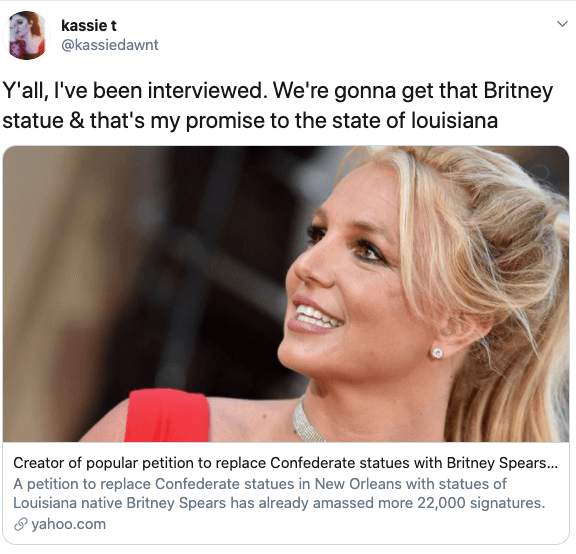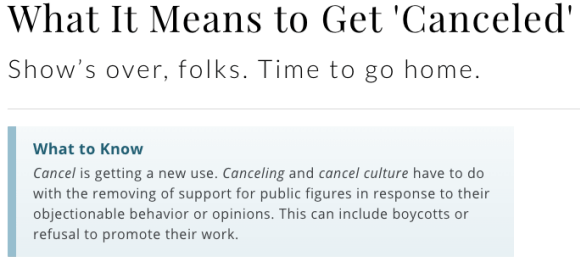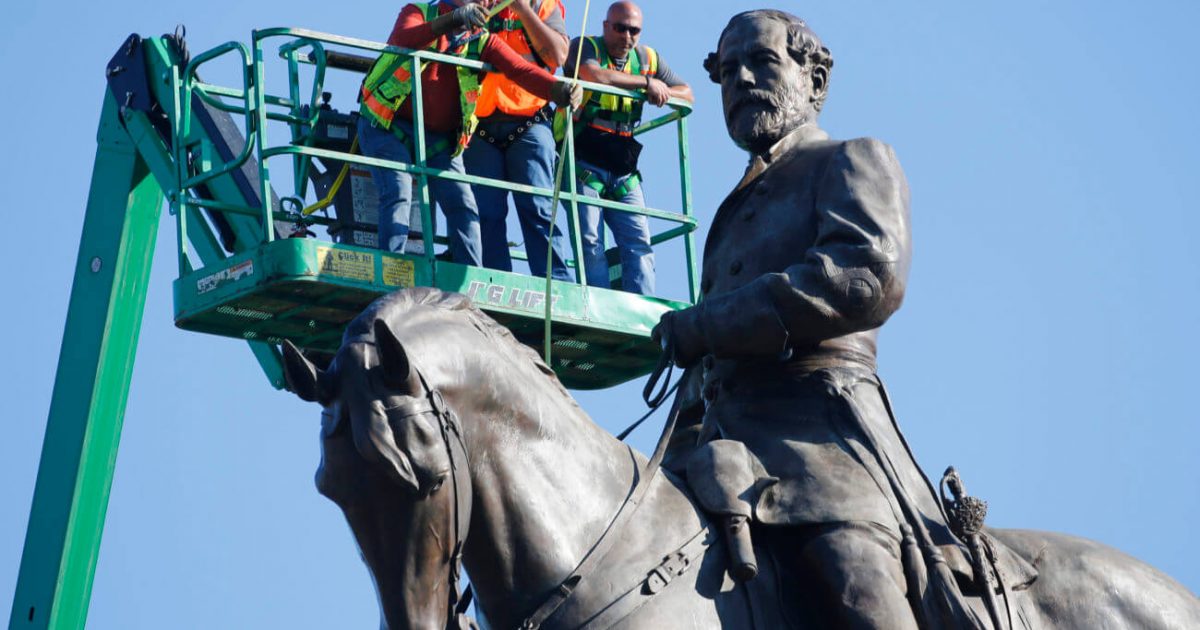- Cancel culture can’t be confused with well-warranted whistleblowing.
- Replacement options for Confederate monuments should include pop culture icons.
- Louisiana should “do the right thing.”
A specific petition started making its way around social media last week. The title led me to believe it was comic relief, but I was relieved to find it wasn’t:
Replace Confederate statues in New Orleans with statues of Louisiana hero Britney Spears
The petition makes some solid points. What’s extra interesting is that it was created three years ago–in other words, it’s not reactionary or ill-intentioned.
The description is brief, and it’s not a parody of itself. It’s not written in stan Twitter colloquialisms. The organizer makes some clear-cut points on why Lousiana native Britney Spears should be the subject of new, non-racist statues in her home state.
Essentially, the first point boiled down to Spears’ veracity. She’s been in the business for a long time, she went through a high-profile media circus about 12 years ago (which inspired the same-year album, aptly titled “Circus”), and she came out on the other side of it.
They highlighted a few of her charitable actions that explicitly focused on Louisiana.
The Britney Spears Foundation redirected a large chunk of 2006 donations towards Hurricane Katrina relief efforts.
In 2016, Spears and Ellen Degeneres partnered with the American Red Cross and raised $250,000 to assist the state’s flood recovery efforts.
Spears was wrapping up her four-year Las Vegas residency when the petition launched (in 2017). A portion of these ticket sales went to assist Louisiana schoolteachers purchase supplies amidst the post-disaster economy.
Just “Do the Right Thing”
They hit on a single-sentence Hollywood highlight and had a simple wrap-up:
Do the right thing: Replace the Confederate statues with an actual Louisiana hero and influencial human being, Britney Spears.
As of this writing, the Change.org petition has surpassed 31,000 signatures of its 35,000 signature goal.
Last Friday, megastar Taylor Swift shared disdain for similar statues residing in her “home” state of Tennessee (Swift is originally from Pennsylvania). She had a big-city rebirth of sorts via 2014’s “Welcome To New York,” but has since made it clear that her residency remains in Nashville.
But she hates the Confederate statues.
She’s Not Wrong
And honestly, neither is the Britney petition’s organizer.
Kassie Thibodeaux is her name, and whether she knew it or not, she sort of echoed Swift in her recent interview with Yahoo!:
If anyone deserves a statue, it should be of an actual good person who has made the world a better place for many.
It’s likely no coincidence that, after Taylor’s Twitter vs. Tennessee exposé, a similar petition began to replace the Tennessee Confederate statues with ones of Dolly Parton.
Another name for Nashville is “Music City.” Wouldn’t it make sense then that “historical figures” also include those who made it “Music City” in the first place?
The same could be said of Spears’ state–New Orleans alone is a gold mine of musical and cultural history.

Does less political equal less polarizing?
I’d love to say that pop culture is less political (and therefore less polarizing), but that’s just not the case–especially since the lines are blurry between chaotic cancel culture and well-warranted whistleblowing.
The tragically common term of “cancel culture” has made Merriam-Webster’s “Words We’re Watching” list:

Still unclear? Maybe you’ve heard this distasteful “encouragement,” which is a byproduct of cancel culture itself: “If Britney can make it through 2007, you can make it through today.”
For one, this “2007” referred to here didn’t even happen in 2007; it occurred in 2008. Culture “canceled” Britney Spears in 2008.
Has she had issues? Yes.
Britney’s also dealt with these issues in front of the world, most of them were personal, and none of them stemmed from an even remotely racist nature.
She’s not a sexual or psychological abuser.
She’s not a criminal.
It’s a non-exhaustive list, of course, but serves as a general framework for similar, extremely valid, significant instances of misconduct that must rely on whistleblowing.
But there must also be a dichotomy drawn between one who is engaging in this sort of blatant, usually ongoing misconduct, and someone who makes a mistake.
What Are The Boundaries?
Britney Spears’ cancelers canceled her after she gave them ten years of memory-making entertainment.
2008 was that weird in-between–that social media purgatory where we were kind of on MySpace, kind of not. This era was the beginning of media culture as we know it.
Forget waiting for The Daily Mail to print in the morning! Perez Hilton, Hollywire, and X17 were giving us gossip in (almost) real-time!
The people who canceled Britney Spears stayed glued to their headlines instead of considering her side of the story.
At the time, Britney was a 26-year-old single mother of two toddlers.
She couldn’t leave the house without at least 100 cameras following her. Some of these photographers were assigned to her full-time.
Multiple helicopters circled her home in hopes of catching her not parenting her children properly.
It’s been 12 years. You’d think the world would have “forgiven” Britney by now. But she’s still the but of the joke when it’s convenient for the conversation.
Britney’s name and backstory simply serve as an example. Fill in the blank with whoever you’d like.
At what point does a mistake become misconduct?
We’ve already determined that non-negotiables exist. So decide what’s forgivable, decide what’s not, then apply those rules to your people and yourself.
Don’t give racists statues, and don’t give rapists statues.
But people like Britney Spears can still have statues.
And when in doubt, a general rule of thumb:
Villains don’t deserve statues. – Taylor Swift
Disclaimer: The opinions expressed in this article do not necessarily reflect the views of CCN.com.




